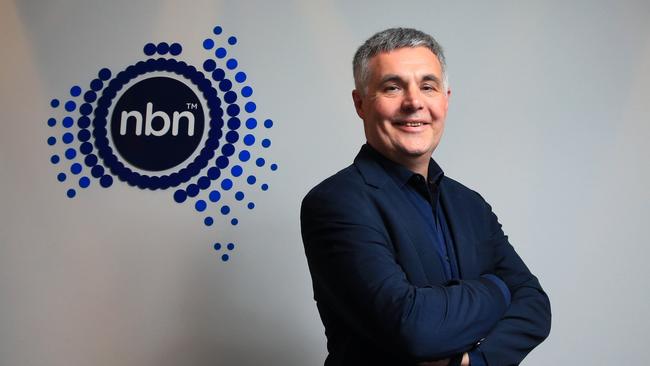Pandemic fuels need for NBN speed
Ongoing Covid lockdowns mean users are choosing faster broadband speeds and downloading more than ever.

As widespread lockdowns continue to spur demand for ultra-fast broadband, NBN Co has narrowed its losses and lifted revenue by 21 per cent year-on-year to $4.6bn, as the company moves towards a likely privatisation.
In its FY21 annual results the company posted earnings before interest, tax, depreciation and amortisation (EBITDA) of $1.35bn in the 12 months to June 30, 2021 – up $2bn from a year earlier – as subscriber payments to Telstra and Optus tapered and 933,00 more customers were added to the network.
The pandemic has also prompted customers to choose higher speeds as NBN embarks on its “Home Ultrafast” upgrade program, with 17 per cent of residential customers on speeds of 100 Mbps and above, compared to 9 per cent a year earlier.
“This is a huge shift in the makeup of our speed tier mix, especially when you consider that just four years ago, the vast majority of customers, some 84 per cent, were on plans of 25Mbps and slower,” CEO Stephen Rue said. “Over that same period, the average monthly download amount per customer has increased from 207 gigabytes to more than 350 gigabytes a month.
“This didn’t just happen. As Australia’s major broadband wholesaler we have supported this migration up the speed tier stack by offering a series of discounts and additional data inclusions to meet our customers’ growing digital needs.”
NBN Co’s statutory result improved by 27 per cent to a $3.8bn loss, compared to a loss of $5.2bn a year earlier, while NBN Co achieved guidance on revenue, connection and upgrade targets. The company raised more than $8bn in private debt during FY21, and had repaid $6.3bn of its $19.5bn Commonwealth loan by June 30 2021, lowering interest payments. Capital expenditure was also down 45 per cent year-on-year to $2.8bn, following the completion of the network’s initial build.
“As the nation faces into new challenges with the lockdowns that were recently imposed in New South Wales, Victoria, Queensland and South Australia, we will continue to support customers and internet retailers through these uncertain times,” Mr Rue said.
“Our financial discipline and the delivery of predictable financial and operational performance gives us a solid foundation for future investment as we work to improve and enhance our customers’ experience of the network.
“Traffic grows in any state or city that goes into lockdown, and it goes up by 20 per cent and sometimes slightly more, then as the cities and states come out of lockdown the traffic goes back to a more normalised level. We see particular trends during the day, when there are clearly kids being schooled from home and and people working from home for example.”
The company is facing ongoing battles with telcos over NBN pricing and pandemic “relief credit” which they say is insufficient. The company is also facing challenges in lifting average revenue per user – which is sitting at $45 per residential customer – flat from the same time a year ago.
“We have talked for a long time at residential ARPU being around $49, and that’s been in our corporate plan for years,” Mr Rue said. “We have always envisaged ARPU will grow over the life of the NBN, and it was always intended that it would be lower in the early days, and then continue to grow. We’re still heading towards that [$49].”
Mr Rue wouldn’t comment on the timing of a future privatisation, declaring that it was a matter for the government. Telstra earlier this year sold half its mobile tower network for $2.8bn, highlighting the soaring value of communications infrastructure, while Optus’ sale of its towers has attracted multiple bidders.
Elsewhere NBN Co flagged a “small volume launch” of on-demand upgrades to full fibre connections for fibre-to-the-node (FTTN) connections, which will be provided to up to 10,000 premises. In May the company announced that 1.1 million premises to date had been identified for a free upgrade, as part of a $3.3bn program announced last year.
The company also pointed to research from Accenture showing that the average NBN customer has saved more than 170 hours in time and effort thanks to broadband connectivity.
It comes after news on Monday that Australia’s three largest telcos – Telstra, Optus and TPG – each allegedly breached consumer law by making false or misleading statements in their promotions of NBN plans, according to the competition watchdog, which has kicked off Federal Court action against them.
NBN Co also announced on Monday it will increase the regions eligible for its fast business fibre zones, adding 44 new zones capable of speeds of up to 1 Gigabit per second.
The expansion, which takes in suburban and regional areas in every state, will also give 60,000 additional businesses access to cloud computing and storage facilities at CBD-equivalent prices. Businesses that sign up for three years will receive free design and construction. NBN Co will not charge the retailer an upfront connection cost.



To join the conversation, please log in. Don't have an account? Register
Join the conversation, you are commenting as Logout